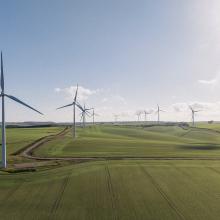Unveiling the new project pipeline to deliver Clean Power…
8 Dec 2025 - 5 minute read
Sign in to add this page to your favourites
Sign in or registerSign in or register to manage your favourites
Sign in or register
In December 2024, we submitted a bold set of connection reform proposals to Ofgem aimed at transforming the connection process to prioritise projects ready to deliver clean power for Great Britain.
In a landmark step toward a clean and secure energy future for Great Britain, today Ofgem has approved our proposed reforms, which will streamline the connection process. This achievement is not only a testament to the hard work of the energy industry but also highlights a collective commitment to reforming connections to get viable clean energy projects connected at pace to power our homes, businesses, transport and more.
The energy sector’s ambition is clear, with a surge of innovative projects already enabling the grid to operate at 95% carbon-free for a short period of time last year. Now, with these reforms, it’s time for the connections process to evolve to facilitate clean power 2030 and beyond.
Our reform proposals are a product of extensive collaboration with industry stakeholders, Ofgem, and Government. Listening, fairness, and collaboration have been pivotal in designing the reforms. Industry feedback has not only been heard but has directly influenced every step of our planning. For instance, we revised our proposed charging structure to incentivise project progression and have protected well progressed projects to ensure fairness throughout the queue.
The current connections queue currently holds over 750GW of projects — four times what we need for 2030 and twice what we need for 2050. Our connection reforms aim to offer faster connections for viable projects aligned with Great Britain’s strategic energy plans. Once implemented, this will result in a more coordinated and efficient network design, benefiting both customers and consumers.
These reforms will transform connections from being a barrier to an enabler of the wider economy. Getting spades in the ground, pushing “ready” projects to the front of the queue, will drive economic growth and facilitate clean power by 2030.
But it’s not just about meeting clean power targets. Reform will also bring much needed certainty to investors and developers, allowing us to seize a £40 billion annual investment opportunity. This will ensure the industry can deliver clean, secure, and affordable energy to homes, businesses, and communities across Great Britain.
Listening, fairness, and collaboration will remain central as we move from design to implementation. We’re committed to getting connection offers out swiftly and providing developers with the certainty they need.
If approved this spring, The Transmission Impact Assessment (TIA) Modification (CMP446) will ensure a proportionate approach to smaller projects like micro solar and community energy so that they don’t need to wait for large transmission upgrades. This will work by lowering the threshold at which an Evaluation of TIA must be undertaken.
Approval of our reform proposals is just the beginning. As we implement these reforms, network companies must build all planned transmission networks on schedule, doubling build over the next five years compared to the last decade.
The path to a sustainable future is clear, and with these reforms, we’re poised to lead the charge towards making Great Britain the global leader in clean power.